
CLEAN WATER AND SANITATION
INTRODUCTION
Around one-third of the global population lack safely managed drinking water, two-fifth of them lacked adequate sanitation facilities and one-fourth lacked basic hygiene.
In India, 95.9% of the population uses safely managed drinking water services but only 27% of domestic waste water is safely treated. Only 70.2% of the population in India live in households with improved sanitation facilities.
According to National Family Health Survey 5, 95.3% of the population live in households with improved drinking water in Karnataka but 88.6% in Dakshina Kannada district. In Karnataka state, 74.8% of the population lives in households with improved sanitation facilities compared to 97.1% in the Dakshina Kannada district. Ensuring access to sustainable water and sanitation services are critical in climate change mitigation strategy for the coming years.
Targets to be achieved
Six targets are set to achieve universal and equitable access to safe/affordable drinking water by 2030. The targets are as follows:
- i. Access to adequate, equitable sanitation and hygiene,
- ii. Improve water quality,
- iii. Increase water use efficiency,
- iv. Ensure sustainable withdrawal and supply of fresh water,
- v. Protect water-related ecosystems and
- vi. Increase support / strengthen the participation of local communities in improving water and sanitation management.
Nitte (DU) Treated Waste-Water Reuse policy
In accordance with SDG 5, Nitte (DU) has constituted a vital wastewater treatment and reuse policy. Treated Waste-Water Reuse policy on water conservation, wastewater generated on campus is collected and treated for non-potable uses like toilet flush, irrigation and water to wash vehicles. It also complies with the Water Act 1974 standards under the State Pollution Control Board. In 2021, Nitte (DU) used around 7.3 lakh litres of water per day on the campus, and around 6 lakh litres of wastewater generated per day was recycled to be used for non-potable purposes.
The policy developed is intended to treat wastewater as an economic resource. It is done with the selection and commission of the latest technological units/technologies for the treatment of wastewater effectively. The technology used is simple to operate, low cost and environment friendly. The policy also endorses treating wastewater for all construction activities inside the university. The ultimate goal is to achieve the zero discharge concept of water conservation.
Infrastructure facilities for wastewater treatment:
Sewage Treatment plants: Nitte (DU) treats water as a valuable resource. It strives to achieve zero discharge concept. We collect 100% of liquid wastewater and have established adequate treatment facilities to enable 100% reuse of treated wastewater.
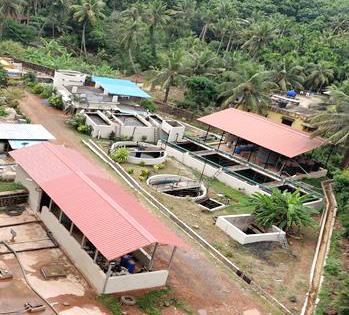
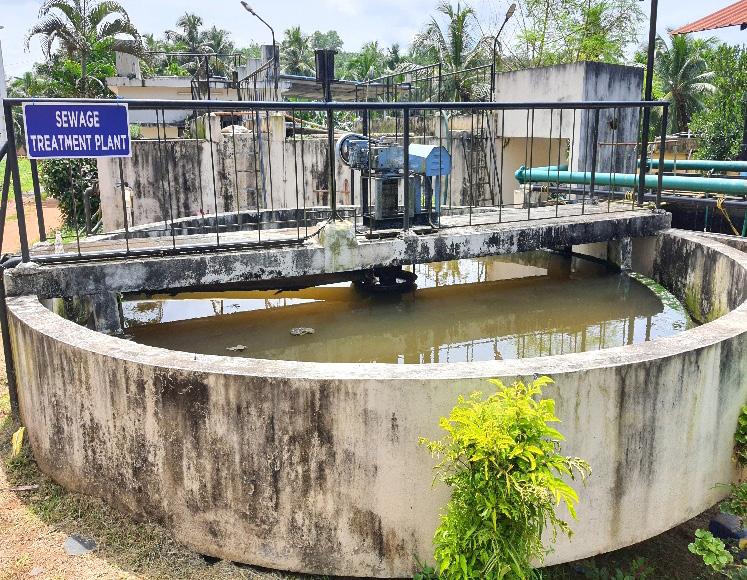
Three Sewage Treatment plants are operational within the campus with a 1450 KLD capacity. These are located in the JKSH Hospital campus (800 KLD), KSHEMA campus (400 KLD) and Paneer campus (250 KLD).
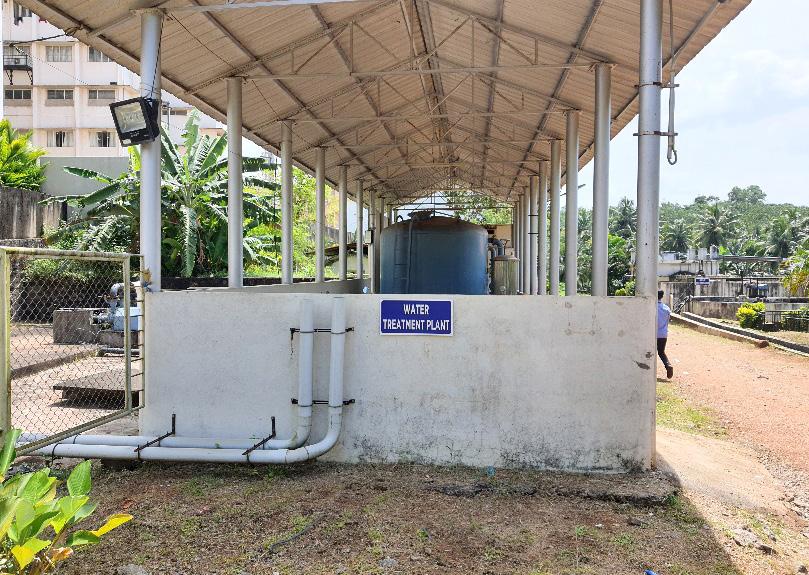
Storm water drainage system is also operational in which rainwater from rooftops is collected using a separate pipeline, stored in raw water storage tanks and treated in wastewater treatment plants consisting of pressure sand filters and subsequently chlorinated for usage in domestic purposes. JKSH charitable hospital collects approximately 2 lakh litres, KSHEMA around 1.5 lakh litres and Paneer campus approximately 1 lakh litre of rainwater with a heavy shower of 30 minutes. Rainwater from roofs is collected using separate pipelines. The terrain of the university is moulded for the natural flow of water. The stormwater is collected at the lowest point of the University campus, where a rain water harvesting open pond is constructed. The location of the pond is based on contour mapping.
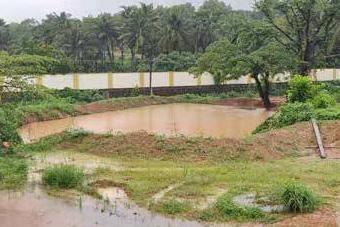
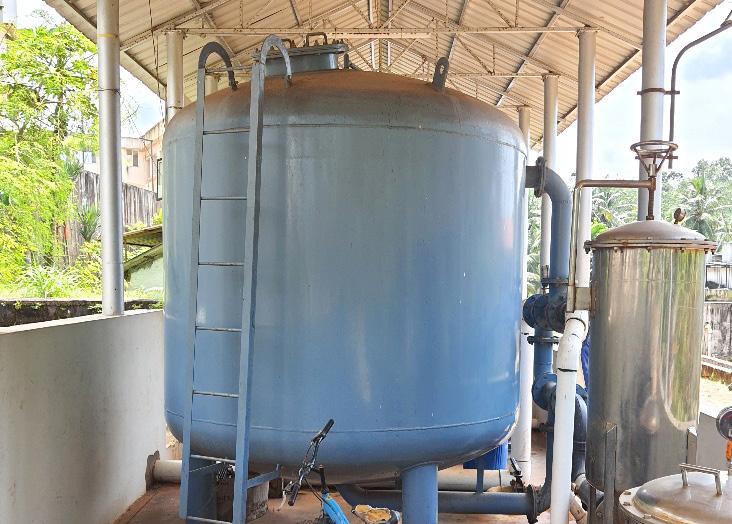
Water conservation and basic sanitation practices:
Nitte (DU) undertakes campaigns to encourage water conservation, the importance of handwashing and basic sanitation in health promotion.
To promote the importance of water conservation, the ‘Every Drop Counts’ campaign is undertaken by the Green brigadiers on campus. All the Drinking water outlets on campus are equipped with educational displays as a gentle reminder for judicious water usage.
WHO handwashing steps are displayed on all hand washing stations to inculcate the practice of handwashing among health care workers and patients in hospital.
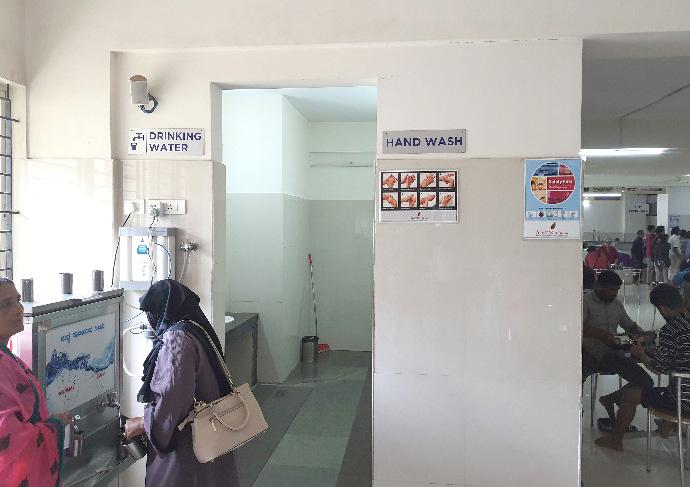
SDG 6 and Education
Several courses such as MBBS, MD/MS, MSc Nursing, BSc Nursing, BSc Bio-Medical Sciences, BSc Medical imaging and Technology, BSc Anaesthesiology and Operation theatre technology, BSc Medical Laboratory Technology and Bachelor of Architecture have inbuilt curricula addressing various aspects, such as the importance of the aquatic ecosystem, the influence of climate change on water resources, the ill effects of water pollution, and the legislature for the prevention and control of water pollution.
Early clinical exposure for First-year MBBS students involves the ‘Concept of Solid waste and sewage disposal at household level’.
Building practices of water conservation
Nitte DU consciously incorporates water conservation practices while designing and constructing buildings on its campus.
- Construction complies with the National Building Code of India 2016 (NBC 2016). Standards IS1172 and
- IS2064 related to Water Supply, Drainage and Sanitation are adhered.
- Water conservation guidelines from Environmental Guidelines for Buildings, Ministry of Environment,
- Forests & Climate Change, Government of India are also referred.
- Some of the good practices followed are:
- Use of water-retaining material like cloth/ gunny bags etc., during curing
- “Ponding” for retaining water on flat concrete structures for curing
- Use of curing chemicals/techniques to minimize water requirements
- Use of non-potable water for construction activities
- Use of water-efficient plumbing fixtures like push-cock taps
- Use of sensor-based and Push taps
- Use of aerators, pressure inhibitors and flow regulators to ensure a constant flow
- Separate pipelines for potable water, water for recycling and treated water are provisioned for during construction
- Provision for rainwater harvesting
- Provision for management of stormwater
- Rainwater storage ponds have been created on the campus for the storage of stormwater
- Rainwater from an artificially created storage pond is used from an off-campus site near the campus. An MoU has been signed with the land-owner for the use of this water
- Usage of recycled water for flushing and gardening.
Nitte (DU) tracks water requirements, wastewater generation and recycling. The audit enables policy decisions for expansion and growth. It creates awareness about water conservation among its stake- holders.
Research and patents:
- Patent titled ‘Technology for removal of Cadmium from contaminated water using non-living micro particular biomass’ was filed by Dr Smitha Hegde and Ms Aastha Srinivasa from Nitte University Centre for Science Education and Research.in 2021
- Dr Sharad Anand under Dr CS Shastry completed his PhD titled ‘A study of hygiene and sanitation, biomedical waste disposal and hospital pharmacy management in tertiary care hospital’.
- A study titled ‘Antibiotic resistance and random amplified polymorphic DNA typing of Klebsiella Pneumoniae isolated from clinical and water samples’ by Giri et al 2021 was conducted and has been published in journal named Water Environment research (Q2 journal) 93(11), 2740-2753.
- A study titled ‘Biofilm characterization in removal of total chemical oxygen demand and nitrate from waste water using draft tube spouted bed reactor’ by Joshi et al 2021 was conducted and has been published in journal named Biotechnology letters (Q2 journal) 43(10), 2001-2009.
- A study titled ‘Drinking and treated water assessment for Coliform bacteria in a tertiary care charitable hospital’ by S Chand et al 2021 was conducted and has been published in journal named Indian Journal of Environment protection (Q4 journal).
Outreach and Services:
- A short video titled ‘Jala’ was made and released on Youtube on the occasion of World water day 22nd March, 2021.
- Bacteriological, chemical analysis of water is undertaken in villages as a part of outreach activity in field practice areas of KSHEMA by the Department of Community Medicine.
- Residual chlorine estimation of water is conducted every week in all the student hostels, hospitals, canteens and Central kitchen by the Department of Community Medicine, KSHEMA
- Timely interventions and corrective actions are initiated to ensure availability of potable water to all within the campus 24x7.
- Monthly bacteriological and chemical analysis of water is conducted by the Department of Community Medicine and Nitte University Centre for Science Education and Research in all the student hostels, hospitals, canteens and central kitchen.
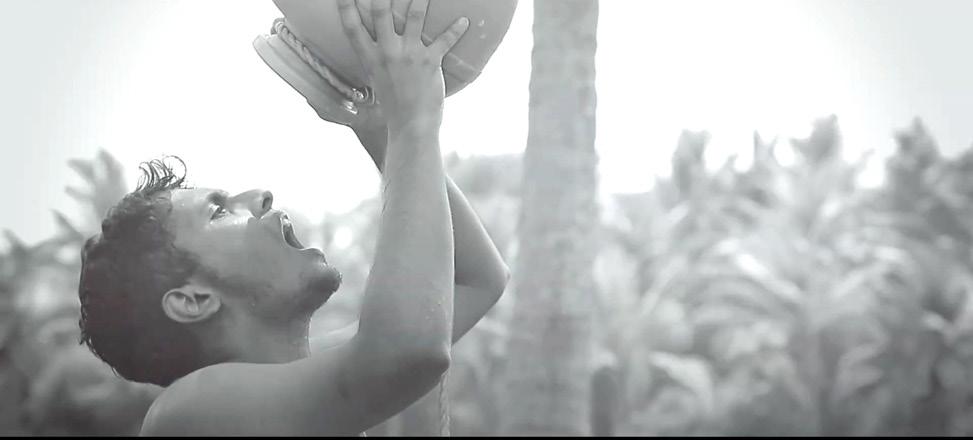


.png)